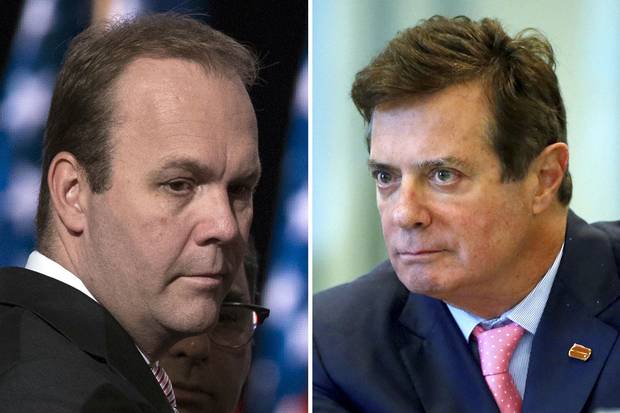A who's who
Paul Manafort: U.S. President Donald Trump's former campaign chairman was taken into custody on Monday and charged in the FBI-led investigation of alleged ties between the Trump administration and the Kremlin. He has pleaded not guilty. Mr. Manafort potentially faces up to 80 years in prison, according to a review of the federal charges and the relevant statutes by Associated Press. Read the full indictment here.

Oct. 30, 2017: Federal agents arrive with former Trump campaign manager Paul Manafort (back seat) in custody at the federal courthouse in Washington.
JONATHAN ERNST/REUTERS
Rick Gates: A protégé of Mr. Manafort, Mr. Gates survived the Manafort exodus from the campaign and went on to have a central role in Mr. Trump's inaugural committee and a lobbying group that was formed to advance the president's agenda. Mr. Gates was forced out of that lobbying group in April amid questions about Russia's interference in the 2016 election. Under the indictment with Mr. Manafort, Mr. Gates faces up to 70 years in prison. He has pleaded not guilty. Read the full indictment here.
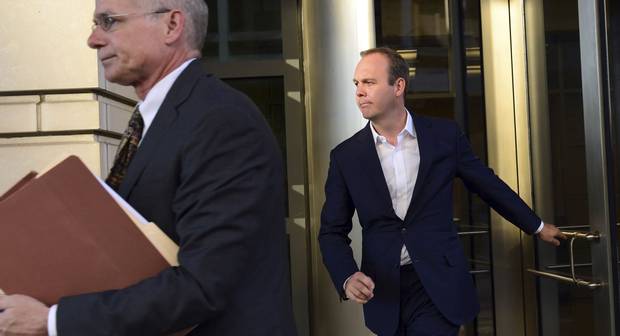
Oct. 30, 2017: Rick Gates, right, leaves federal court in Washington.
SUSAN WALSH/ASSOCIATED PRESS
George Papadopoulos: Mr. Papadopoulos is an international energy lawyer who was on Mr. Trump's advisory team during the 2016 campaign. But Trump aides have said he played a limited role in the campaign and no access to Mr. Trump. He pleaded guilty to lying to investigators on Oct. 5 in a case unsealed on Monday, the office of Special Counsel Robert Mueller said in a statement. His case is unrelated to the one against Mr. Manafort and Mr. Gates. Read the full indictment and plea bargain here.
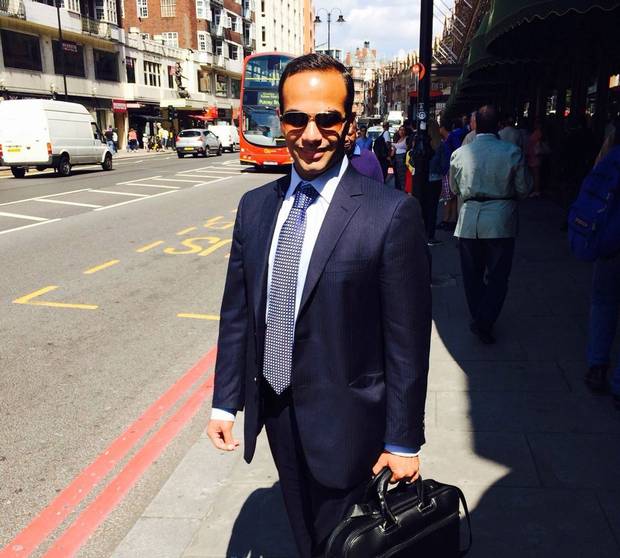
George Papadopoulos.
What did Manafort and Gates allegedly do? An overview
Illicit lobbying: Prosecutors allege that Mr. Manafort and Mr. Gates worked as unregistered agents of the government of Ukraine and the Party of Regions, a pro-Russian political party led by Victor Yanukovych. While serving as president of the former Soviet republic from 2010 to 2014, Mr. Yanukovych was closely aligned with Russian President Vladimir Putin. (The Globe's Mark MacKinnon weighs in on Mr. Manafort's dealings in Ukraine here.)
Money laundering: The indictment says that up to $75-million (U.S.) flowed through overseas accounts controlled by the two Americans. Mr. Manafort is alleged to have laundered more than $18-million he used to buy property and goods in the United States. Mr. Gates is alleged to have transferred more than $3-million to accounts he controlled.
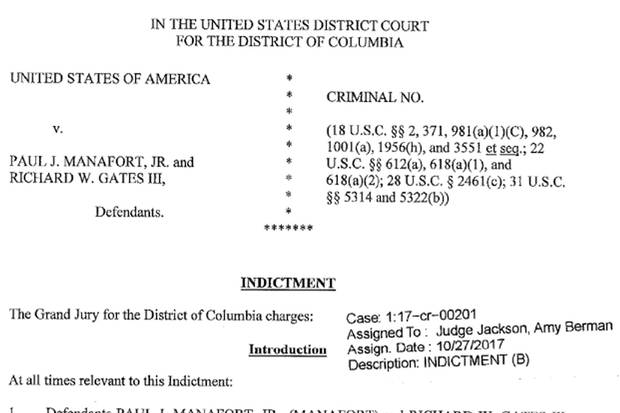
COURT DOCUMENTS
What the Manafort-Gates charges say
Here is a summary of the charges against Mr. Manafort and Mr. Gates encompassed in the 31-page indictment and the potential penalties.
Count 1: Conspiracy Against the United States
Both men are charged with conspiring together and with others to knowingly and intentionally defraud and commit crimes against the United States between 2006 and 2007.
Possible sentence: Five years in prison each and up to $10,000 in fines.
Count 2: Conspiracy to Launder Money
Both men are charged with conspiring together and with others to transfer funds from outside the United States to and through places inside the country without properly disclosing the transactions or paying required federal taxes.
Possible sentence: Up to 20 years in federal prison and a fine of either $500,000 or twice the monetary value of the property involved in the transaction, whichever is greater.

The indictment lists corporations founded by Mr. Manafort and Mr. Gates, alleging they were used to hide their payments from Ukraine’s Party of Regions from American authorities. Here, the document lists payments involving a company in Cyprus. Other alleged shell companies were based in Saint Vincent and the Grenadines and the Seychelles.
COURT DOCUMENTS
Counts 3-6: Failure to File Reports of Foreign Bank and Financial Accounts
The indictment alleges that for each calendar year between 2012 and 2015, Mr. Manafort failed to disclose to the U.S. Treasury Department that he had a financial interest in and authority over bank accounts in a foreign country involving more than $10,000.
Possible sentence: Up to 10 years in federal prison for each of the four counts and fines of up to $100,000, or up to 50 per cent of the total value for the transactions, for each of the four years encompassed in the counts.
Counts 7-9: Failure to File Reports of Foreign Bank and Financial Accounts
The indictment also alleges that, between 2012 and 2014, Mr. Gates failed to disclose to the U.S. Treasury Department that he had a financial interest in and authority over bank accounts in a foreign country involving more than $10,000.
Possible sentence: Up to 10 years in federal prison for each of the four counts and fines of up to $100,000, or up to 50 per cent of the total value for the transactions, for each of the four years encompassed in the counts.
Count 10: Unregistered Agent of a Foreign Principal
Prosecutors allege that both men failed to register with the U.S. attorney general as foreign agents of the government of Ukraine, the Party of Regions and Mr. Yanukovych between 2008 and 2014.
Possible sentence: Up to five years in federal prison and up to $10,000 in fines.
Count 11: False and misleading statements under the Foreign Agents Registration Act
The indictment alleges that both men made multiple false statements to federal officials in relation to their failure to register as foreign agents of the Ukrainian government.
Possible sentence: Up to five years in federal prison and up to $10,000 in fines.
Count 12: False Statements
Prosecutors allege that between November, 2016, and February, 2017, that Mr. Manafort and Mr. Gates conspired together and caused others to make false statements and conceal crimes against the United States.
Possible sentence: Up to five years in prison.
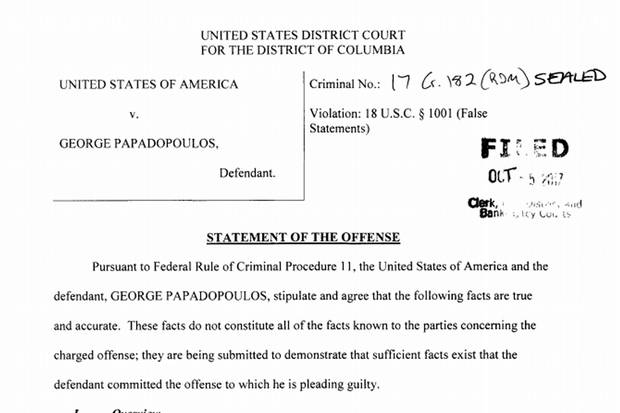
COURT DOCUMENTS
What the Papadopoulos charges say
The court document said Mr. Papadopoulos made false statements to the FBI shortly after Mr. Trump's inauguration on Jan. 20, when the law enforcement agency had an open investigation into Russian government efforts to interfere in the 2016 U.S. presidential campaign.
Possible sentence: Up to five years in prison and a $250,000 fine, though under the plea bargain, prosecutors promised to seek a much lesser sentence.
The meeting
Mr. Papadopoulos's Russian contacts began in March of 2016, shortly after he joined the Trump campaign as a foreign-policy adviser. He started by making overtures to a London-based university professor he met in Italy. The man is unidentified in Justice Department documents, but The Washington Post has previously named him as Joseph Mifsud, director of the London Academy of Diplomacy. On March 24, Mr. Papadopoulos met the professor and a "female Russian national" who falsely presented herself as Russian President Vladimir Putin's niece in London. When Mr. Papadopoulos told his higher-ups in the campaign about the sit-down, one replied "great work."
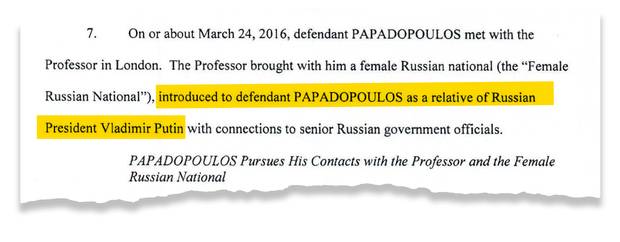
Trump in attendance
On March 31, 2016, Mr. Papadopoulos was photographed (third from left) sitting a few seats away from Mr. Trump at a Washington "national-security meeting" of the campaign team. During the session, the document says, Mr. Papadopoulos said that he had contacts that could pull together a meeting between Mr. Trump and Mr. Putin.
The lie
Over breakfast in London on April 26, 2016, the professor told Mr. Papadopoulos that Russia had "thousands of e-mails" that contained "dirt" on Ms. Clinton – presumably a reference to the hacked Democratic National Committee e-mails that would later be released through Wikileaks. When the FBI asked Mr. Papadopoulos about this information, he insisted he learned about the e-mails before he joined Mr. Trump's campaign. Mr. Papadopoulos insisted it was merely "a very strange coincidence" that he received this information.

The coverup
The day after his second interview with the Federal Bureau of Investigation, in February, 2017, Mr. Papadopoulos deactivated his Facebook account and created a new one, and also switched telephone numbers. This was designed to dissociate himself from his communications with his Kremlin intermediaries, including the professor and another man connected with the Russian foreign ministry.
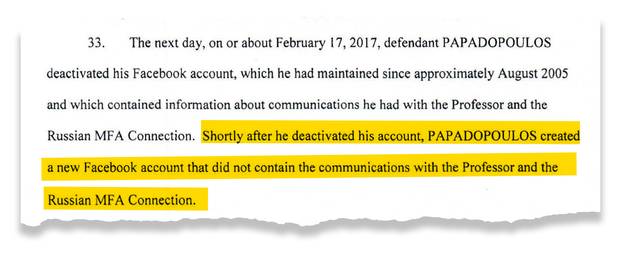
Game over
On July 27, 2017, Mr. Papadopoulos was arrested at Dulles International Airport near Washington. After his arrest, the document notes, Mr. Papadopoulos "met with [Mr. Mueller's investigators] on numerous occasions to provide information and answer questions." Separately, Mr. Papadopoulos's plea agreement stipulates that the government will make sure the court knows that he is co-operating with the investigation – a factor that could get him a lighter sentence – on condition he continues to "provide information."
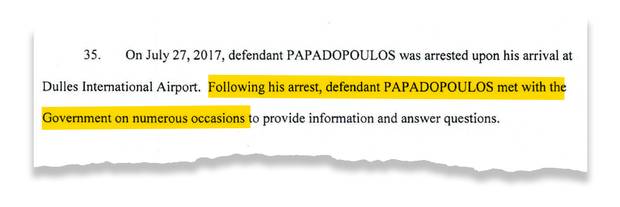
What Trump says
The President responded to Monday's allegations on Twitter, claiming that Mr. Manafort and Mr. Gates's alleged wrongdoing came "years" before they worked on his campaign. The indictment, however, says their activities began through "at least 2016." Mr. Trump's campaign launched on June 16, 2015.
Sorry, but this is years ago, before Paul Manafort was part of the Trump campaign. But why aren't Crooked Hillary & the Dems the focus?????
— Donald J. Trump (@realDonaldTrump) October 30, 2017
....Also, there is NO COLLUSION!
— Donald J. Trump (@realDonaldTrump) October 30, 2017
He repeated those claims the following morning, adding that Mr. Papadopoulos had been an unknown, minor player in the campaign who has now "proven to be a liar."
The Fake News is working overtime. As Paul Manaforts lawyer said, there was "no collusion" and events mentioned took place long before he...
— Donald J. Trump (@realDonaldTrump) October 31, 2017
....came to the campaign. Few people knew the young, low level volunteer named George, who has already proven to be a liar. Check the DEMS!
— Donald J. Trump (@realDonaldTrump) October 31, 2017
Associated Press, with reports from Adrian Morrow, Evan Annett, The New York Times and Reuters
TRUMP AND RUSSIA: MORE FROM THE GLOBE AND MAIL
